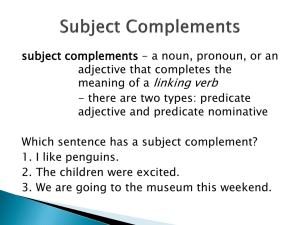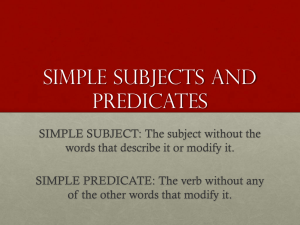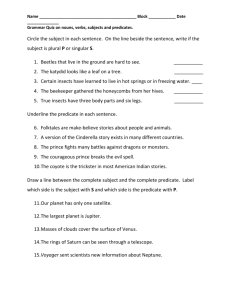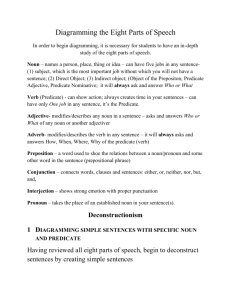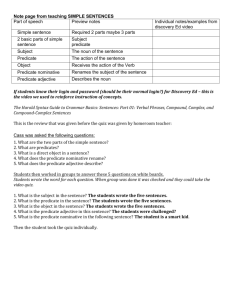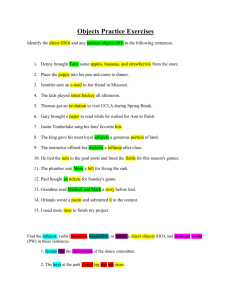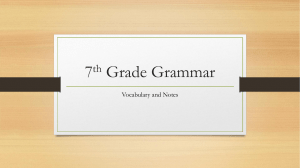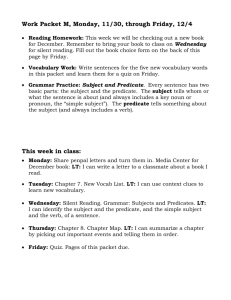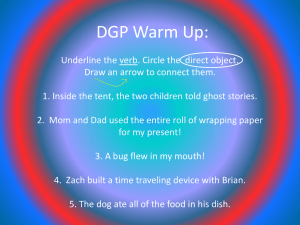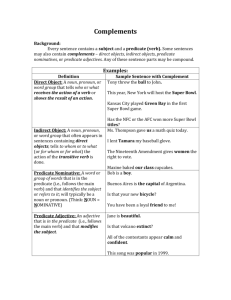File
advertisement
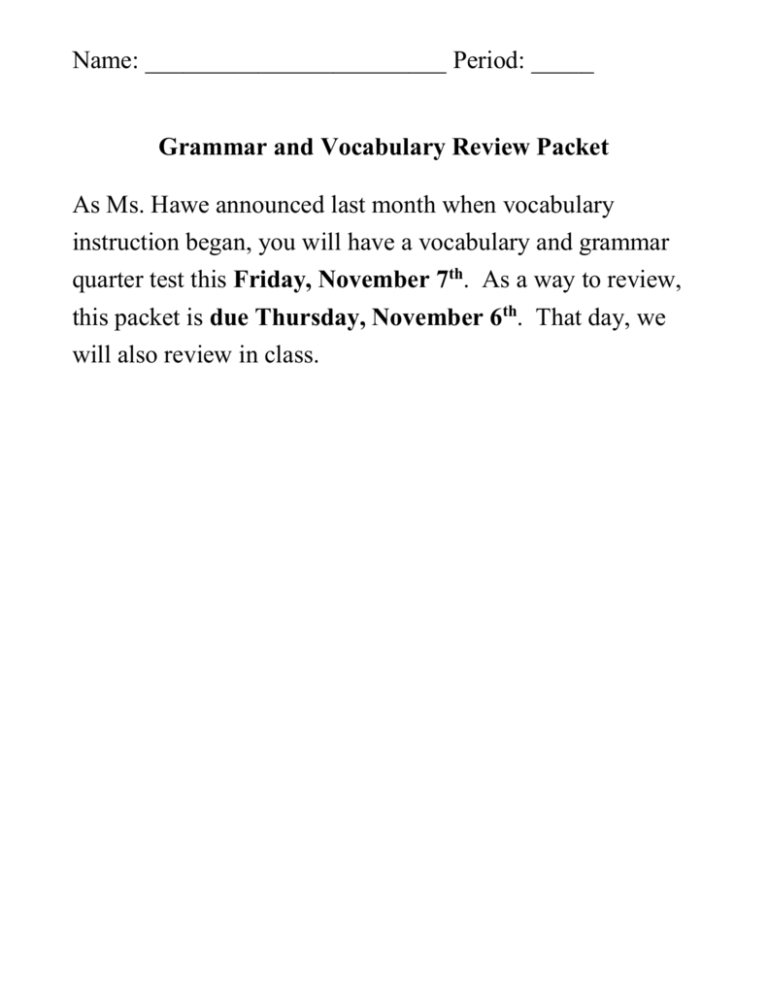
Name: ________________________ Period: _____ Grammar and Vocabulary Review Packet As Ms. Hawe announced last month when vocabulary instruction began, you will have a vocabulary and grammar quarter test this Friday, November 7th. As a way to review, this packet is due Thursday, November 6th. That day, we will also review in class. Name: ______________________________________ Period: _____ Date: ___________ Adjective, Noun, Verb, Adverb Bootcamp Nouns are words that are used to name things (people, places, things). Adjectives are describing words for nouns. They make nouns more interesting. Verbs are doing words (like run or jump) or state of being words (like am or is or are). Adverbs tell us more about verbs (Get it? It’s like adjective plus verb = adverb!). They tell us how, when or where the action of the verb happens. TIP: They usually end with the letters “ly.” Directions: Fill in the following table using adjectives, nouns, verbs and adverbs. When you have filled in a row, read what you have written. Does it make sense? It can be silly, but it has to make sense grammatically. Try saying it out loud – does your tongue trip over the words or does it sound okay? Once you’ve done a few, have some fun and try to make each word in the sentence begin with the same letter, like this... Slimy Snake Slithers Slowly Cautious Cat Creeps Carefully If you need help coming up with words, feel free to use the internet for help! You are blessed with a world of technology at your fingertips! Use it! Note: You cannot use the same word twice! Adjective Noun Verb Adverb slimy snake slithers slowly Name: __________________________________________ Period: ______ Date: ______________ Subject and Predicate Practice Refresh Your Memories: Simple Subject: A noun or pronoun that tells whom or what the sentence is about. Complete Subject: The noun or pronoun and the words or phrases that describe it. Simple Predicate, or Verb: An action or state of being word that tells what the subject is, does, or has. Complete Predicate: The action or being word or phrase and the words or phrases that modify it. Natural Order: the subject comes before the predicate. This is the way we generally write our sentences. Inverted Order: Part of the complete predicate or all of it comes before the subject. Directions: Write down the complete subject and complete predicate in each of the following sentences. Then, write the simple subject and simple predicate. These sentences are all in natural order. 1. The students in the 12th grade have completed all their classes. complete subject: ___________________________________________________________ simple subject: _________________________ complete predicate: _________________________________________________________ simple predicate: _______________________ 2. Two English classes are scheduled for the girls. complete subject: ___________________________________________________________ simple subject: _________________________ complete predicate: _________________________________________________________ simple predicate: _______________________ 3. Julie has designed the banner for the party. complete subject: ___________________________________________________________ simple subject: _________________________ complete predicate: _________________________________________________________ simple predicate: _______________________ 4. One of the committee members for the dance has booked the band. complete subject: ___________________________________________________________ simple subject: _________________________ complete predicate: _________________________________________________________ simple predicate: _______________________ *TURN TO OTHER SIDE* Inverted Sentences Tip: When the sentence is written as a question, try to change it to a statement. Did you find the key? You did find the key. Subject = you and predicate = did find Remember, “here” and “there” will never be the subject!! 5. Was the bird a household pet? complete subject: ___________________________________________________________ simple subject: _________________________ complete predicate: _________________________________________________________ simple predicate: _______________________ 6. Will you help me with the chores? complete subject: ___________________________________________________________ simple subject: _________________________ complete predicate: _________________________________________________________ simple predicate: _______________________ 7. There will be fifty children on the field trip. complete subject: ___________________________________________________________ simple subject: _________________________ complete predicate: _________________________________________________________ simple predicate: _______________________ 8. Here is the answer. complete subject: ___________________________________________________________ simple subject: _________________________ complete predicate: _________________________________________________________ simple predicate: _______________________ Subject/Verb Agreement Practice Directions: Read each sentence and choose the word listed below the sentence that would appropriately fill in the blank. Use your grammar notebook for help! 1. Either the physicians in this hospital or the chief administrator _____ going to have to make a decision. (HINT: what do your notes say about words like each, everyone, either, and neither?) is / are 2. Some of the votes __________ to have been miscounted. seem / seems 3. Some of the grain __________ to be contaminated. appear / appears 4. The tornadoes that tear through this county every spring _____ more than just a nuisance. is / are 5. Everyone selected to serve on this jury _____ to be willing to give up a lot of time. have / has 6. Kara Walters, together with her groupmates, __________ a wonderful report to the class. (Hint: Don’t get confused by phrases that come in between the subject and the verb.) present / presents 7. He seems to forget that there __________ things to be done before he can graduate. is / are 8. There _________ to be some people left in town after yesterday’s flood. (Hint: Here and There are never the subject. In sentences that start with these words, the subject often comes after the verb.) have / has 9. Three-quarters of the students __________ against the tuition hike. was / were 11. Three-quarters of the student body __________ against the tuition hike. was / were VOCABULARY FLASHCARDS For 5 extra points on your test, create flashcards for this quarter’s vocabulary and show me either Thursday or Friday.
